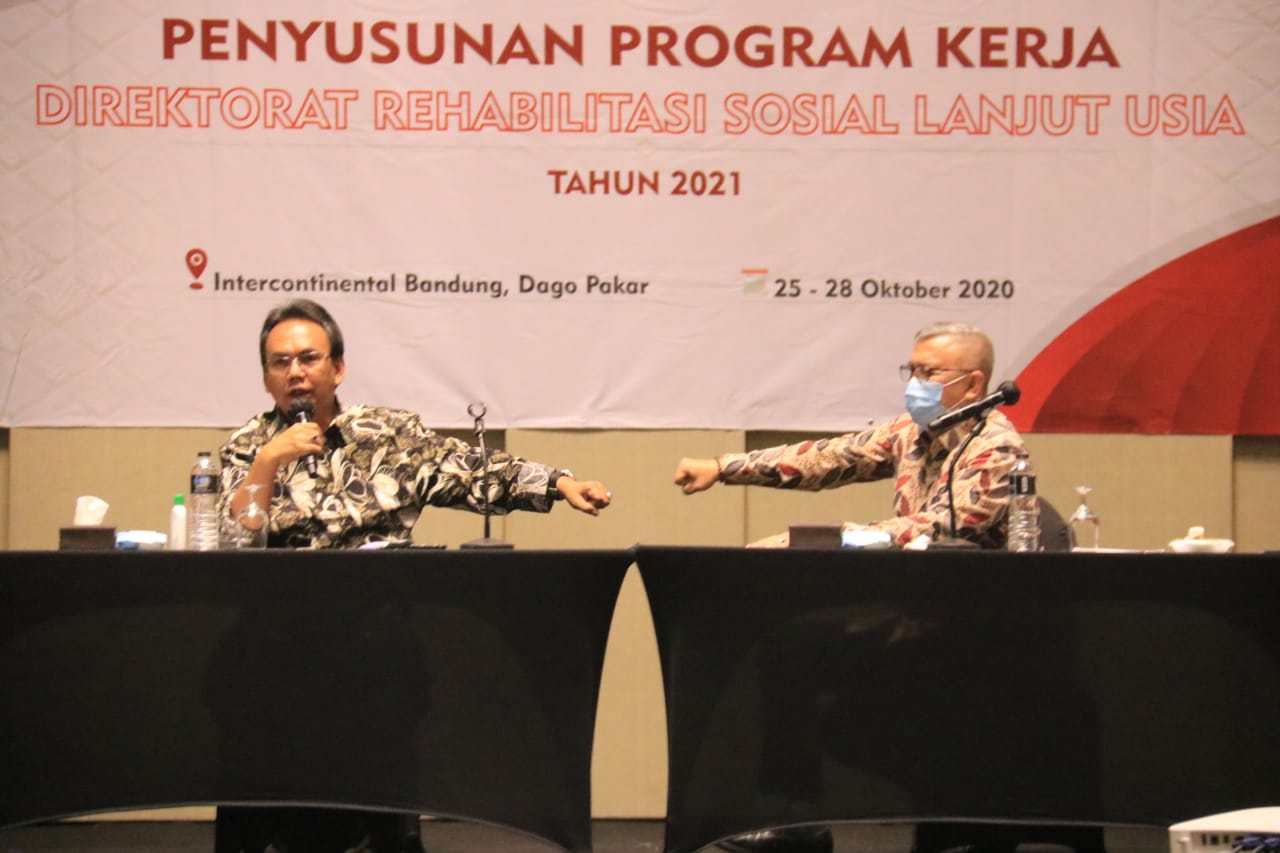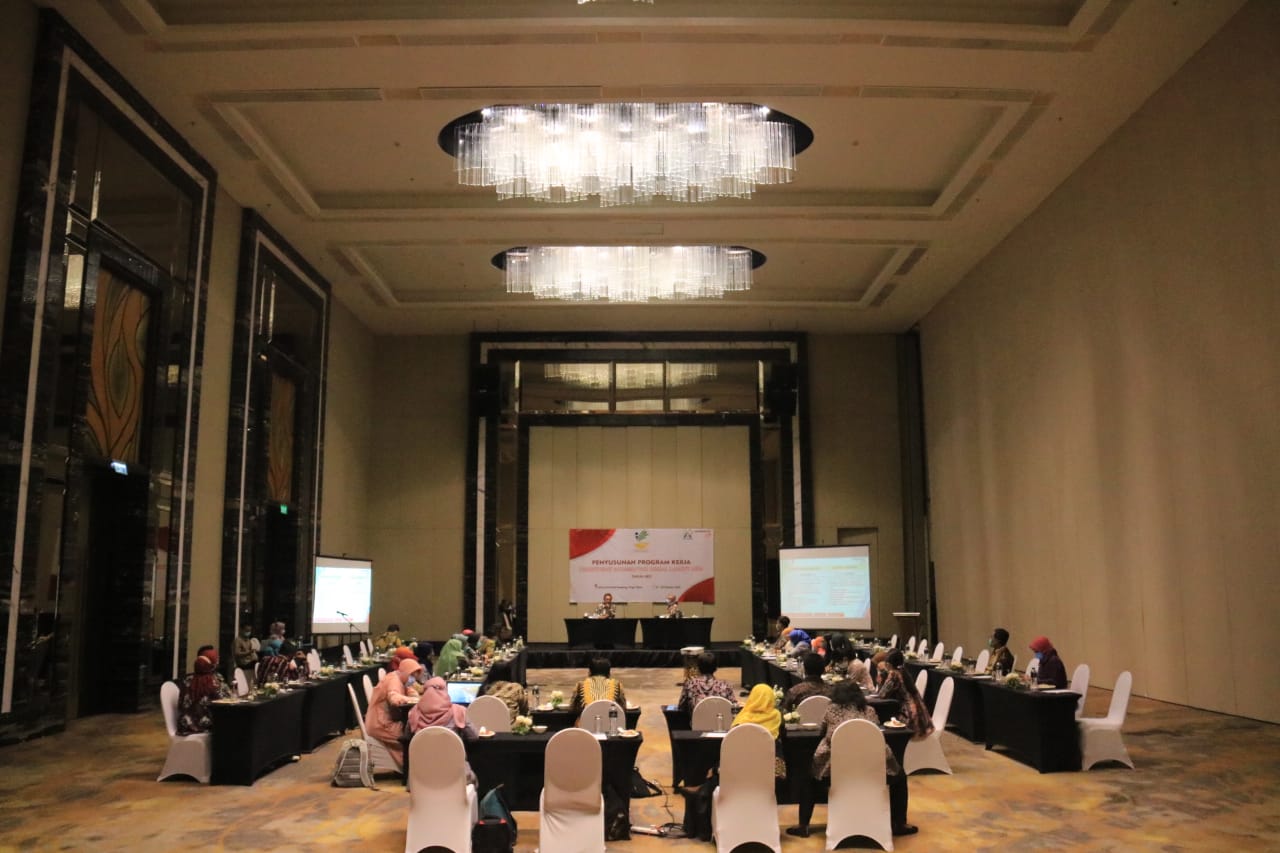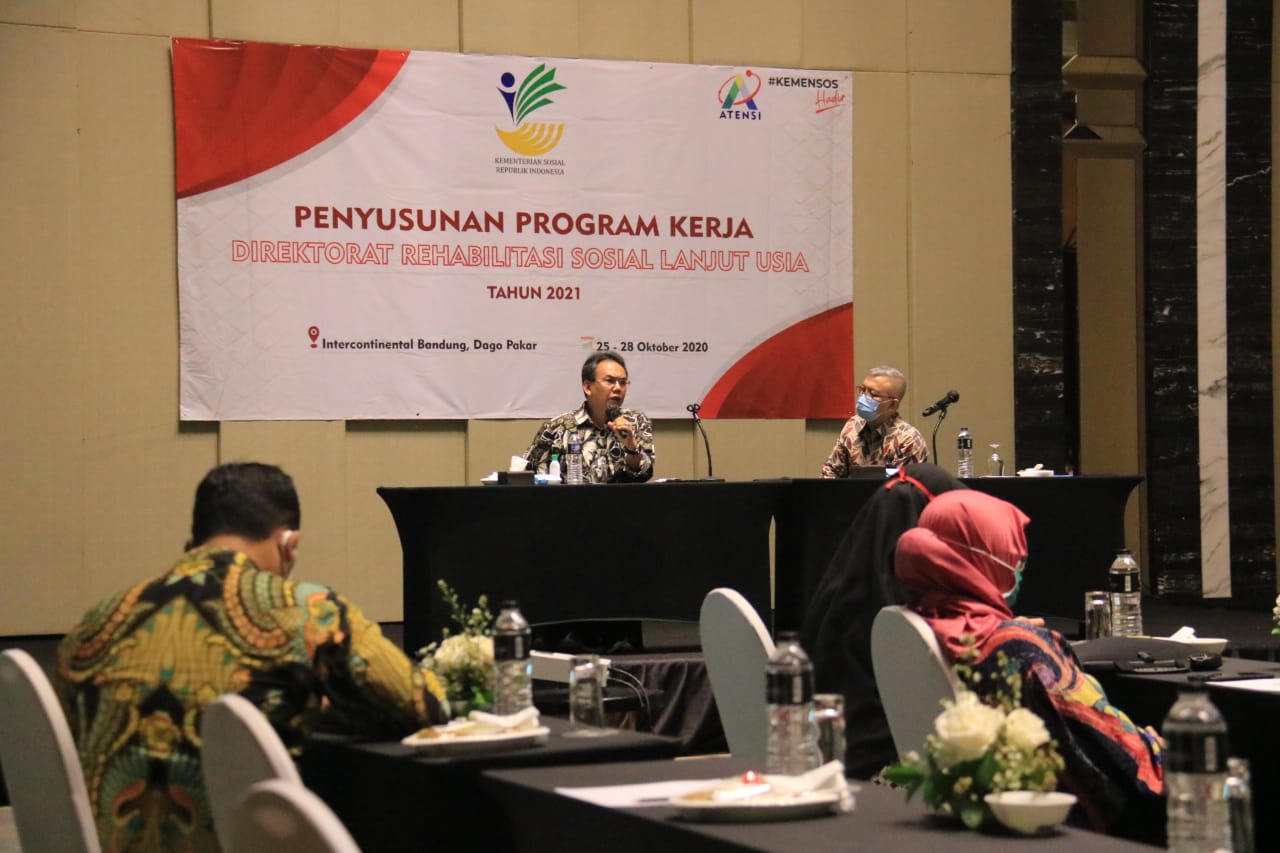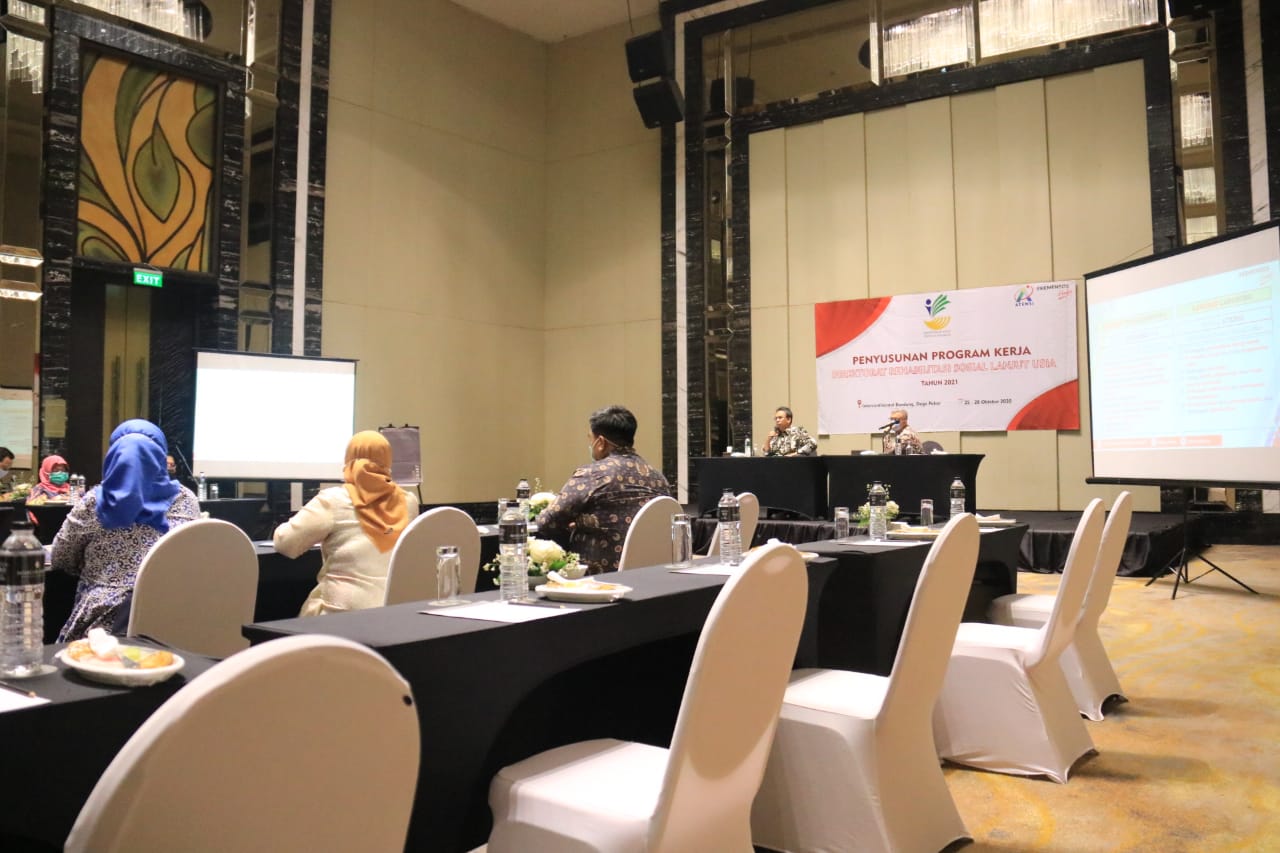Writer :
Humas Ditjen Rehsos
Editor :
Intan Qonita N
Translator :
Intan Qonita N
BANDUNG (October 25, 2020) - The Indonesian Minister of Social Affairs, Juliari P. Batubara directed to make elderly people more enthusiastic and empowered. This was stated by the Minister of Social Affairs during the 2020 International Elderly Day.
Therefore, the Director General of Social Rehabilitation of the Indonesian Ministry of Social Affairs, Harry Hikmat, developed a new initiative to strengthen the function and role of the Social Rehabilitation Center in providing services to beneficiaries, especially the elderly.
"So the Social Rehabilitation Center really becomes a role model in providing maximum service to beneficiaries, including the elderly," Harry said, after the Preparation of the Work Program for the Directorate of Social Rehabilitation for the Elderly, at the Intercontinental Hotel, Bandung City, Sunday (25/10/ 2020).
Harry emphasized that the government through the Ministry of Social Affairs is here for the social welfare of the elderly with the Social Rehabilitation Assistance (ATENSI) policy. The background of the emergence of this policy is due to respect, protection, and fulfillment of the rights of the elderly.
“The Ministry of Social Affairs has a hall and must have a maximum service function, as well as a wider reach. Therefore, a change in approach is needed, not only based on residential, but also based on family and community. That's what we call Social Rehabilitation Assistance," he explained.
Harry explained that old age is the final stage of development in the human life cycle and is marked by a person's failure to maintain a balance of health and physiological stress conditions. Elderly is also associated with decreased ability to live and sensitivity individually.
"Many elderly experience social dysfunction including health problems, and are vulnerable to behavior or acts of violence in society," he said.
Elderly data recorded at the Central Statistics Agency in 2019 of the 267 million Indonesian population, 9.60 percent or 25.66 million are elderly. Meanwhile, from DTKS data in 2019, poor elderly reached 12.6 million, within the family (10.7 million), outside the family (1.9 million), and recipients of the Family Hope Program (PKH) as many as 1.1 million.
"Indonesia is one of the countries that will enter the era of the aging population, because in 2020 the number of elderly people has reached 10 percent," said Harry to the activity participants who are employees of the Directorate of Social Rehabilitation for the Elderly and the Secretariat of the Directorate General of Social Rehabilitation.
Therefore, the Director General of Social Rehabilitation of the Indonesian Ministry of Social Affairs, Harry Hikmat, developed a new initiative to strengthen the function and role of the Social Rehabilitation Center in providing services to beneficiaries, especially the elderly.
"So the Social Rehabilitation Center really becomes a role model in providing maximum service to beneficiaries, including the elderly," Harry said, after the Preparation of the Work Program for the Directorate of Social Rehabilitation for the Elderly, at the Intercontinental Hotel, Bandung City, Sunday (25/10/ 2020).
Harry emphasized that the government through the Ministry of Social Affairs is here for the social welfare of the elderly with the Social Rehabilitation Assistance (ATENSI) policy. The background of the emergence of this policy is due to respect, protection, and fulfillment of the rights of the elderly.
“The Ministry of Social Affairs has a hall and must have a maximum service function, as well as a wider reach. Therefore, a change in approach is needed, not only based on residential, but also based on family and community. That's what we call Social Rehabilitation Assistance," he explained.
Harry explained that old age is the final stage of development in the human life cycle and is marked by a person's failure to maintain a balance of health and physiological stress conditions. Elderly is also associated with decreased ability to live and sensitivity individually.
"Many elderly experience social dysfunction including health problems, and are vulnerable to behavior or acts of violence in society," he said.
Elderly data recorded at the Central Statistics Agency in 2019 of the 267 million Indonesian population, 9.60 percent or 25.66 million are elderly. Meanwhile, from DTKS data in 2019, poor elderly reached 12.6 million, within the family (10.7 million), outside the family (1.9 million), and recipients of the Family Hope Program (PKH) as many as 1.1 million.
"Indonesia is one of the countries that will enter the era of the aging population, because in 2020 the number of elderly people has reached 10 percent," said Harry to the activity participants who are employees of the Directorate of Social Rehabilitation for the Elderly and the Secretariat of the Directorate General of Social Rehabilitation.
Harry said that the direction of this policy is in the form of strengthening the social rehabilitation system that is integrated with the protection of the elderly. Then strengthening the social rehabilitation system that is integrated with social security, social empowerment, and social protection for beneficiaries. In addition, expanding the reach of social rehabilitation for family, community and residential-based beneficiaries, as well as strengthening the capacity and institutions of the Social Rehabilitation Center and Social Welfare Agencies (LKS).
“Then increase prevention, education and sensitization campaigns in all sectors and society. And, increasing the role of the community and the private sector in social rehabilitation services," he explained.
The Ministry of Social Affairs prioritizes a family-based approach. If the family is limited to handling it, it can be done by LKS in the community or Center as a residential base. The Elderly ATENSI Business Process is carried out based on an initial assessment to determine the services provided. Family-based ATENSI is preferred because the family is the place where the elderly fulfill their physical and psychological needs. This ATENSI process will be carried out by the Social Rehabilitation Centers through assistants/social workers.
“88 percent of the elderly are still living with their families or partners. The family base is still strong in Indonesia. So if the elderly have problems and are taken to a center or orphanage, it is not necessarily effective,” he admits.
The solution is to do home care or services at home. However, competent human resources (HR) must be prepared to become caregivers. The reason is, in order to provide care for the elderly, it is necessary to pay attention to nutritional needs, physical needs such as physical activity, manage stress and do not leave the elderly alone.
"This is what we are developing, how to prepare caregivers from within the house, such as children or grandchildren," concluded Harry.
“Then increase prevention, education and sensitization campaigns in all sectors and society. And, increasing the role of the community and the private sector in social rehabilitation services," he explained.
The Ministry of Social Affairs prioritizes a family-based approach. If the family is limited to handling it, it can be done by LKS in the community or Center as a residential base. The Elderly ATENSI Business Process is carried out based on an initial assessment to determine the services provided. Family-based ATENSI is preferred because the family is the place where the elderly fulfill their physical and psychological needs. This ATENSI process will be carried out by the Social Rehabilitation Centers through assistants/social workers.
“88 percent of the elderly are still living with their families or partners. The family base is still strong in Indonesia. So if the elderly have problems and are taken to a center or orphanage, it is not necessarily effective,” he admits.
The solution is to do home care or services at home. However, competent human resources (HR) must be prepared to become caregivers. The reason is, in order to provide care for the elderly, it is necessary to pay attention to nutritional needs, physical needs such as physical activity, manage stress and do not leave the elderly alone.
"This is what we are developing, how to prepare caregivers from within the house, such as children or grandchildren," concluded Harry.
Share :
 English
English
 Bahasa
Bahasa




